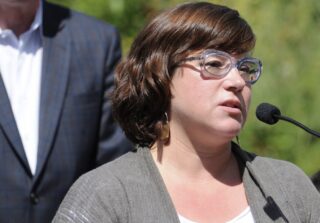
(Photo: Jonathan Maus/BikePortland)
In yet another piece of very good news for people who are concerned about the Oregon Department of Transportation’s plans to expand Interstate 5 through the Rose Quarter, Portland City Commissioner Chloe Eudaly released a pointed statement via Facebook about the project on Tuesday evening.
Eudaly said she’s joining the Portland Public Schools Board, Albina Vision, and other groups in calling for a more thorough analysis of the project’s impacts to the community. “I believe it’s more than called for,” she wrote, referring to her belief that ODOT should complete a full Environmental Impact Statement (EIS) instead of just an Environmental Assessment (EA, learn more about the differences between the two here).
“The added auxiliary lanes on I-5 will not deliver meaningful safety, environmental, or equity benefits to Portland.”
— Chloe Eudaly, Portland City Commissioner
Going further, Eudaly expressed serious doubts about the project. She dismissed its planned freeway expansion and surface street improvements as merely “nice” and said, “As it stands the added auxiliary lanes on I-5 will not deliver meaningful safety, environmental, or equity benefits to Portland.”
Despite her misgivings, Eudaly says since funds for the project were passed by the legislature (via HB 2017, which included $30 million to pay for project bonds starting in 2022), there’s nothing she and her City Council colleagues can do about it. “These funds, which come from the State Highway Fund, are restricted and not under my control, neither is the highway, or any ODOT owned properties in our city,” she wrote. Eudaly also revealed that she’s been told if the I-5 Rose Quarter project dies, the funds would simply be reallocated to another freeway expansion project in the region. (Note: Eudaly refers to “all $500 million for the highway and surface streets,” but that’s not what the legislature has approved for the project.)
Advertisement
Eudaly also echoed the opinion expressed by Metro Council President Lynn Peterson on Monday, that ODOT needs to do much more to embrace the Albina Vision plan. She even used the term “remediation” when calling for ODOT to do more to mitigate the harms of past Rose Quarter developments on black people who lived in the now-razed Albina neighborhood. Remediation is the same word used by Albina Vision spokesperson Rukaiyah Adams in her own stinging assessment of ODOT’s conduct around the project thus far.
“I urge all who support this approach to contact the OTC and let them know that you support Portland’s Central City Plan and expect congestion pricing to be part of any work on the I-5 corridor.”
And despite ODOT’s attempts to decouple congestion pricing from this project, Commissioner Eudaly said she thinks making people pay to drive on this section of the freeway is “the best solution for reducing traffic.” She feels so strongly about congestion pricing she plans to send a letter to the Oregon Transportation Commission (OTC, the governor-appointed body that oversees ODOT), “reminding them” that the Portland’s Central City Plan was amended last year specifically to ensure that congestion pricing is in place prior to the completion of the I-5 Rose Quarter project.
“I urge all who support this approach to contact the OTC,” Eudaly wrote, “and let them know that you support Portland’s Central City Plan and expect congestion pricing to be part of any work on the I-5 corridor.”
As per HB 2017, all revenue collected from congestion pricing would go into a “Congestion Relief Fund.” ODOT spokesperson Don Hamilton told me via email in February 2018 that, “Specific decisions about how to allocate those funds will be determined later.”
Eudaly’s statement puts the City of Portland in a strange position: For many months now, ODOT staff has touted the close partnership and support they have from PBOT on this project. Now PBOT staff are in the awkward position of having to work on a project their own Commissioner isn’t too thrilled about.
In related news, the Congress for New Urbanism put I-5 on its list of Freeways Without a Future report released today.
CORRECTION, 4/4: An earlier version of this story said revenue from Congestion Relief Fund would be managed via the State Highway Fund. That was incorrect. New tolling revenue would not be part of the highway fund. I regret the error.
— Jonathan Maus: (503) 706-8804, @jonathan_maus on Twitter and jonathan@bikeportland.org
Never miss a story. Sign-up for the daily BP Headlines email.
BikePortland needs your support.

